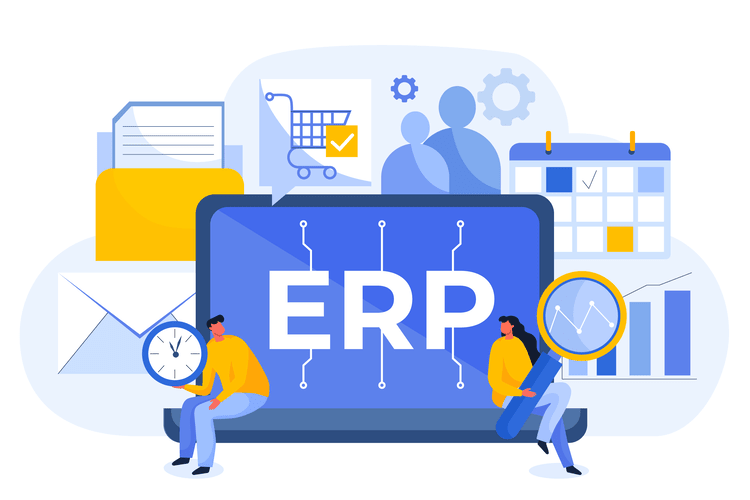Custom ERP software development is transforming businesses with tailored solutions that surpass off-the-shelf software limitations. Custom ERP can boost efficiency and productivity, providing a competitive edge by addressing unique pain points and enabling better-informed decisions. The future of business optimization is here!
According to G2 “The global ERP software market is projected to reach $78.40 billion by 2026, growing at a CAGR of 10.2% from 2019 to 2026.”
In a world captivated by ERP, where technology keeps evolving and imagination turns to reality, staying ahead of the curve is crucial. So, despite the years in the industry, ERP systems remain agile and swift, consistently matching steps with the latest trends. Pretty evident why their demand keeps soaring – the power to significantly reduce operational costs and streamline processes! But that is just the tip of the iceberg you see, as it can do a lot more than that. So without further ado, let’s start the odyssey of ERP software development!
Talk to BinaryFolks ERP consultants
What is ERP Software Development?
ERP software is like a well-trained circus master for your business operations, keeping everything connected, coordinated, and functioning seamlessly. With custom ERP software built around your business needs, you can centralize information sharing, automate most of the tasks, and track end-to-end business processes in real-time, enabling better usage of your human resources as they’re freed from the repetitive, time-consuming tasks to focus on the cognitive tasks.
Sweet! Now that we've got the ball rolling, it's time to dive deeper into the nitty-gritty of ERP systems. We'll be discussing all the problems, solutions, and options available, so get ready for an exciting ride! Let’s start with the challenges of ERP implementation first.

Challenges of Implementing ERP Systems into your Business
.png)
(1) Setting a Reasonable Budget
Budget is always a primary concern when you think about starting or modifying any business operations. Now to say getting an ERP system is cheap would be a lie and to say it’s too costly would be a stretch. But don’t take it as a frivolous expense, it is an investment. Now, ERP systems’ cost varies according to a number of factors, like the number of modules, price, features, the company offering it, etc. Also, If you opt for custom ERP software development, you will see a different type of cost structure. It can be a difficult process to fit your budget, so here’s what you can do.
How to Overcome: If you want to avoid overspending, it will be a good idea to focus on understanding what makes the cost models change. Take note of which features and modules fit both your budget and needs. It is a challenge for sure. However, it's a knot that's not so hard to open, as extensive research can save you from your ERP investment going south.
.png)
(2) Selecting Befitting Modules
Let’s say your budget is handled, now let’s talk about the important element, ERP modules that your business needs. Nobody knows your business’s needs better than you do. So, you need to make the best choice possible based on research and knowledge. With lots of options to choose from, you need to find an ERP model that is budget-friendly, covers all corners, and fits your business infrastructure. And those are just the primary requirements, there are many more boxes that need to be filled before you choose an ERP model for your business.
How to Overcome: To avoid wasting resources and time, in this step, you need to chalk out your requirements precisely. Plan on what modules your business requires, and jot down the features you need in those modules. This will quickly become your checklist and help you avoid ERP modules that you don’t need. In case, your requirements don’t match premade ERP systems in the market you can always opt for custom ERP software development.

(3) Implementation Complexity
After you find your perfect ERP system, you will face the next challenge which is the implementation of the system in your business. The problems that you may face in this step would be data transfer problems, data quality issues, and other feature malfunctions. Although the main problem with implementing an ERP system is that for every new update, be it the addition of a new module or feature or removing one, the complexity changes.
How to Overcome: It is crucial to approach module selection and feature inclusion with skepticism and thoroughness. Select only the necessities at the first step so as to avoid excess complexity. Equally important as that is the selection of a competent development team since they will be tasked with successfully implementing the ERP system.

(4) Security Risk
Simply put, ERP systems are supposed to connect to your business operations at the root level. Thus, exposing a large area of vulnerability, for exploitation. People like cyber hackers can easily penetrate into your system and infect your business with viruses, imposing great threats on your confidential data. Risk and luck are partners in business trials. While luck can run out on you, risk won’t. So, in the long run, while using an ERP system in your business, it’s important to keep these risks checked.
How to Overcome: Smart ways to upgrade your security will be multifactor authentication, routine updates, and strict security policies. All of these are futuristic precautions while implementing ERP into your business.

(5) Maintenance and Upgrade
Maintenance is crucial for ERP models. ERP software will make your business operations streamlined but without proper maintenance after launching it, you will find irregularities and anomalies disrupting your workflow. Bugs can easily interrupt your operations and even lead to significant data loss, data duplication, overloading, etc.
How to Overcome: In this scenario, it is vital to have a developer team well-versed in debugging & keeping ERP system health in check. Make sure your developers get acquainted with your business's ERP setup, as this will prove invaluable when addressing any potential operational issues.
![]()
Benefits Of Custom ERP Software
.png)
(a) Tailored for your Business
Custom ERP software doesn’t have any junk features. It only includes features that directly cater to your business needs. So, your business processes are executed faster, with higher efficiency.
.png)
(b) Scalability
Be ready, not just for today but for tomorrow as well. Custom ERP software can be easily modified, expanded, or integrated with new functionalities, allowing for long-term scalability and adaptability. So, as requirements pop up you can add new modules and features that will help you optimize your business operations.

(c) Easy Maintenance
Custom ERP software lets you choose and refine features according to your business’s needs. From maintenance schedules to custom upgrades and updates, all are under your control. Custom ERP software offers the flexibility to upgrade your software on your own terms and preferences. If you need a new feature or new module you can simply reach out to the same team who created the software. This streamlined approach minimizes the maintenance time as the team is already familiar with the ERP structure.
.png)
(d) Integration
Custom ERP systems allow flexibility in choosing integration methods, such as direct API (Application Programming Interface) integration, custom data connectors, or middleware solutions. Now, the integration method depends on the organization's legacy system landscape and integration capabilities. With a customized integration process data transfer will be easy and will also lower the risk of data loss during transmission.
What is the Difference Between Off-the-shelf and Custom ERP Software Development?
1. Off-the-shelf ERP Software
Being built around generic concerns & interests, an off-the-shelf ERP software has limitations. That means, you get a mix of features that you need and those you absolutely don’t. Bottom-line is, you get excess junk & miss out on a set of necessary ones! Making a business workout is definitely not an easy nut to crack, you have to do the obvious and make smart investments that accelerate your business's growth. Off-the-shelf ERP softwares is not the worst choice, as they do get the job done after all. But your company needs are the decision-making factors that will tell you what kind of ERP system will work for you.
2. Custom ERP Software
Custom ERP software development offers a highly customized and systematized ERP system specifically tailored to meet the unique requirements of a particular business, ensuring streamlined operations and efficient management of diverse processes. So, it combines rich features with a focused approach, eliminating unnecessary complexities.
3. Core Differences
- Development & Integration: OTS is ready to use so it can be deployed quickly whereas Custom ERP takes time to recognize the vision and mission of the business and forms a smart strategy that ensures effective functioning post deployment.
- Cost & Customization: OTS demands a comparatively lesser upfront cost as it is made keeping only the generic concerns of the industry in mind. However the customization is challenging due to standardization whereas custom ERP is built from scratch and adds features that can directly aid your business-specific needs, meaning a little higher upfront cost & a much higher ROI.
- Source Code: OTS doesn’t provide source code due to business confidentiality, so you will encounter a lack of flexibility and will be dependent on the vendor, which may also lead to lock-in, ceasing future growth opportunities with that ERP. In the case of Custom ERP you own the source code so you are not dependent on the vendor.
- Architecture: OTS has complex architecture and can create problems if you change the existing business pattern or operational workflow. Custom ERP has a precise architecture that can provide versatile and robust solutions.
Common Types of ERP Systems Modules
.png)
Finance
.png)
Research
.png)
Sales and Marketing

Supply Chain Management
.png)
Manufacturing and Production
.png)
HR

CRM

Customer Support

Custom

Cost of Custom ERP Software
The cost of custom ERP software can vary depending on several factors based on your business-specific requirements. Here are some general factors that are considered while estimating the cost of ERP software:
.png)
(1) Development and Integration of the Software
The development of the ERP software and integration of it into your business is an obvious factor. Now, every business is different and may have different internal systems that they operate on, we call them the legacy systems. So, custom ERP software development is done keeping these legacy systems in mind for easy integration, avoiding any data loss, security breaches, and flawless data transmission. This can be a complex process and depending on the same the cost may fluctuate. Other than that the number of modules, number of users, and customized features also affect the cost of custom ERP software. These can be taken care of by consulting with a good custom ERP development company.
.png)
(2) The Complexity of the Modules
Custom ERP software offers a prime benefit and that’s flexibility. As the boundaries of limited features are lifted, you are allowed to make suggestions for the seamless operations of your business. The more precision and features of ERP you add, the cost of ERP software increases. Now this totally depends on how you want your business modules to work and interact. So you have full control over which features you want to integrate now and may keep some in store for the future. Planning it wisely can help you build your custom ERP software without breaking your budget.
.png)
(3) Maintenance and Support
Custom ERP software development, can save a lot of time and money in accounts of maintenance and upgrade. If you have a team of developers, they can easily maintain the smooth running of your ERP system, without much hassle. Your ERP platform is based on your business process architecture, which means a familiar base that allows developers to learn their ropes around the custom ERP software, easily and quickly. Now, let’s say you don’t have a team of developers, in that case, you can count on the custom ERP software development company for your maintenance and upgrades.
ERP Trends
Let’s take a look at some ERP trends that are reflecting ongoing advancements in technology and increasing the need for ERP systems to adapt to changing business landscapes.

[A] Cloud-Based ERP
We are living in cloud generation, so it is kind of obvious to expect the fusion of ERP software and the cloud. Mixing features of ERP and cloud brings functionality to the next level. Cloud adds value to ERP by allowing users to work from anywhere. So, remote work collaboration, and additional security and data protection that is usually an added advantage given by cloud providers, making cloud-based ERP a trending hot topic.
.png)
[B] IoT
Implementing IoT in ERP promises a better future. IoT sensors collect real-time data, which is fed into the ERP system, providing better visibility and insights. This can help businesses make data-driven decisions, improve efficiency, reduce costs, and increase customer satisfaction. So, it's a win-win situation!

[C] Two-tier
A two-tier ERP system brings the best of both worlds by combining the benefits of a centralized and decentralized approach. It allows for better control and visibility at the corporate level while enabling flexibility and agility at the business unit level. This results in improved efficiency, cost savings, and better decision-making.
.png)
[D] Artificial Intelligence (AI)
Artificial Intelligence (AI): AI-powered ERP systems can automate repetitive tasks, provide valuable insights, and even predict future outcomes. With AI in ERP, you can take your business operations to the next level and stay ahead of the competition.

[E] Mobile Access
With mobile access to ERP, your business is always at your fingertips. Whether you're in the office, on the go, or lounging on a beach, you can manage operations, track inventory, and make informed decisions right from your mobile device. So, get your business working at your fingertips!
.png)
[F] Industry-Specific ERP
Industry-specific ERP solutions cater to the unique needs of a particular industry. By incorporating industry-specific processes and functionalities, these ERPs streamline operations, improve productivity, and help companies get their work done faster. So, if you want to take your business to the next level, consider implementing an industry-specific ERP solution.
Steps to Build a Custom ERP System for your Business
.png)
(a) Research
As a prominent player in your industry you know how important research and gathering information is. Implementing an ERP system into your business is an important commitment, so take your time and measure your options wisely. The two most important things to consider are your business needs today and tomorrow. Note down your business requirements for your ERP software, and use that to develop the perfect ERP solution.

(b) Vendor Search/Development Partner
Carefully investigate your Custom ERP software development company and their deal. Properly examine the claims, background, and past projects and always take interviews to make sure they know the stuff and are not just bluffing.

(c) Techstack
Be very choosy in this step. Select what you need and make them a priority, separate what you want next, and make them secondary. If you have a very long vision for your future keep those modules up the shelf and let them be “future additions”. With properly planned ERP software, you can get a good deal off the implementation complexity.
.png)
(d) Development and Testing
Roll up your sleeves for this one, cause this is where the important work starts. Remember your priorities and keep checks on the features, listen carefully to the updates, and make sure to question even the obvious doubts, if you feel uneasy. We believe in a close-knitted feedback loop to make sure our clients aren’t in the dark or don’t get any surprises in the end.

(e) Implementation
Lay out your plan of implementation before you start developing your software. But here is a pro tip for the implementation of ERP, the transition means the extraction of old data and insertion of it in the new system. So, always ask about the implementation strategy before you sign up for an ERP.

(f) Update and Maintenance
Now, all that is left to do is keep up the good work. Like every good working machine, your ERP software needs maintenance, to keep it smooth and running. Updating and maintaining your software helps in adding new features as the requirement persists, also it keeps the bugs in check.
Hi! We are BinaryFolks
We hope we are able to bring you a better understanding of the ERP software. Let's now delve into the reasons why you should choose BinaryFolks to develop your custom ERP software.
- We have a solid experience in custom software development for 12+ years. And we understand that experience alone is not enough, which is why we bring a wealth of expertise to every project. While working with various industry leaders, we have gathered exquisite knowledge and experience, and we would love to share it with you!
- Are you curious about the latest trends in ERP software? We are too! There is nothing we enjoy more than creating a better tool with cutting-edge technologies like IoT, AI, cloud, etc. So with experience in 70+ cloud development applications, we are thrilled to work with you next on your innovative idea.
- Our customer base is a melting pot. We got so much diversity while working with entrepreneurs, business leaders, industry champions, innovators and the list goes on. So, with a return rate of 94%, can we dare say we are worth a shot?
- With ex-Google and ex-Amazon engineers at the helm, we bring a level of experience and expertise that takes your software product to the next level.
At BinaryFolks, we live by the motto "Facts over fiction". That's why we don't make grand claims or subscribe to the "fake it till you make it" mentality. We believe in creating products that are truly worth it. Plus, we provide NDAs and 24/7 customer support to ensure you're always in the loop and well-protected.
Conclusion
We hope your journey here has been enlightening. Together, we explored the challenges of the ERP industry, marveled at the benefits of custom ERP, and caught a glimpse of the exciting future of ERP solutions. At last, we met BinaryFolks, who are empowering you for a futuristic journey.
Get Complimentary ERP Consultation Now!




.png)